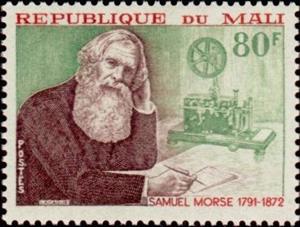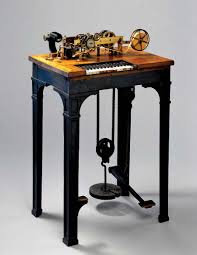Stamp: Samuel Morse (1791-1872) and First Telegraph (Mali 1972)
Samuel Morse (1791-1872) and First Telegraph (Mali 1972)
05 June (Mali ) within release Samuel Morse Death Centenary goes into circulation Stamp Samuel Morse (1791-1872) and First Telegraph face value 80 Malian franc
| Stamp Samuel Morse (1791-1872) and First Telegraph in catalogues | |
|---|---|
| Michel: | Mi:ML 327 |
| Yvert et Tellier: | Yt:ML 171 |
Stamp is horizontal format.
Stamp Samuel Morse (1791-1872) and First Telegraph it reflects the thematic directions:
An invention is a unique or novel device, method, composition, idea, or process. An invention may be an improvement upon a machine, product, or process for increasing efficiency or lowering cost. It may also be an entirely new concept. If an idea is unique enough either as a stand-alone invention or as a significant improvement over the work of others, it can be patented. A patent, if granted, gives the inventor a proprietary interest in the patent over a specific period of time, which can be licensed for financial gain.
Telegraphy is the long-distance transmission of messages where the sender uses symbolic codes, known to the recipient, rather than a physical exchange of an object bearing the message. Thus flag semaphore is a method of telegraphy, whereas pigeon post is not. Ancient signalling systems, although sometimes quite extensive and sophisticated as in China, were generally not capable of transmitting arbitrary text messages. Possible messages were fixed and predetermined, so such systems are thus not true telegraphs.
An invention is a unique or novel device, method, composition, idea, or process. An invention may be an improvement upon a machine, product, or process for increasing efficiency or lowering cost. It may also be an entirely new concept. If an idea is unique enough either as a stand-alone invention or as a significant improvement over the work of others, it can be patented. A patent, if granted, gives the inventor a proprietary interest in the patent over a specific period of time, which can be licensed for financial gain.


